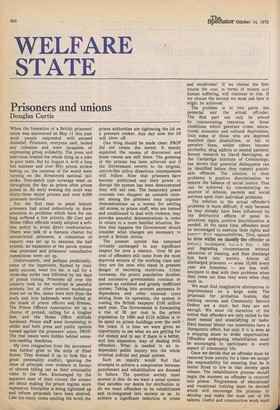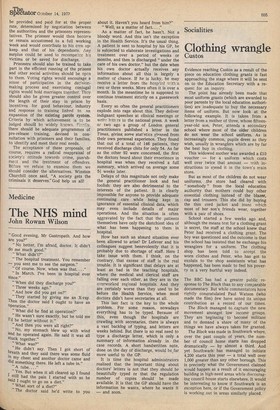WELFARE STATE
Prisoners and unions
Douglas Curtis
When the formation of a Britis'n prisoners' union was announced on May 11 this year most people responded with amused disbelief. Prisoners, everyone said, lacked any cohesion and were incapable of expressing group solidarity. The press and television treated the whole thing as a joke in poor taste. But by August 4, with a long hot summer and over fifty prison strikes behing us, the cameras of the world were turning on the threatened national jailstrike. Test-match type coverage went on throughout the day as prison after prison joined in. By early evening the score was thirty-three major prisons and over 9,000 prisoners involved.
For the first time in penal history prisoners had acted collectively to draw attention to problems which have for too long suffered a low priority. Mr Carr and Home Office officials wisely adopted a softline policy to avoid direct confrontation. There was talk of a humane charter for unconvicted prisoners, a committee of inquiry was set up to examine the bail system, an expansion of the parole system was promised and prisoners' consultative committees were set up.
Unfortunately, and perhaps predictably, some of the organisers, flushed by their early success, went too far. A call for a three-day strike was followed by ten days of prison rioting. Prisoners all over the country took to the rooftops in peaceful protests but at other prisons workshops were set on fire, slates were torn from the roofs and iron bedsteads were hurled at the heads of prison officers and firemen. The Prison Officers Association set up a chorus of protest, calling for a tougher line, and the Home Office attitude hardened. Prison staff were threatening to strike and both press and public opinion turned against the prisoners' union, PROP. The real issues were hidden behind sensation-seeking headlines.
My own resignation from the movement was further grist to the mills of Fleet Street.. They dressed it up to look like a great personality conflict, ignoring the issue of principle over violence in favour of thieves falling out as their criminality came to the fore. Encouraged by the apparent ease of their victory the screws set about making the prison regime more repressive. Discipline is being tightened up and reform proposals have been shelved. Like too many cooks spoiling the broth the prison authorities are tightening the lid on a pressure cooker. Any day now the lid will blow off.
One thing should be made clear: PROP did not create the unrest. It merely exploited the causes of discontent and those causes are still there. The greening of the prisons has been achieved and if the Government reverts to its original, ostrich-like policy disastrous consequences will follow. Now that prisoners have become politicised and their power to disrupt the system has been demonstrated they will not rest. The temporary peace conceals two dangers: an unstable element among the prisoners may organise demonstrations as a screen for settling old scores, or prison staff, who are trained and conditioned to deal with violence, may provoke peaceful demonstrations in order to return to a more familiar situation. Before that happens the Government should consider what changes are necessary to avoid a British Attica.
The present system has remained virtually unchanged in any significant respect for over a century. Over 90 per cent of offenders still come from the most deprived sectors of the working class and they are the ones who stand in greatest danger of becoming recidivists. Crime increases, the prison population doubles, and successive governments continue to operate an outdated and grossly inefficient system. Taking into account payments to dependants and other external costs arising from its operation, the system is costing the British taxpayer E100 million each year. The Government is forecasting a rise of 50 per cent in the prison population by 1980 and E110 million is to be spent on prison buildings over the next ten years. It is time we were given an opportunity to see what we are getting for our money and to say if there is a better, and less expensive, way of dealing with offenders. What is needed is an independent public inquiry into the whole criminal judicial and penal system.
Such an inquiry would find that attempts to achieve a compromise between punishment and rehabilitation are doomed to failure. The question society must answer is this: do we want a penal system that satisfies our desire for retribution or do we want offenders to be rehabilitated and re-integrated into society so as to achieve a significant reduction in crime and recidivism? If we choose the first course the cost, in terms of money and human suffering, will continue to rise. If we choose the second we must ask how' it might be achieved.
The problem is in two parts: the potential and the actual offcnder.
The first part can only be solved by concentrating resources on those conditions which generate crime; educational, economic and cultural deprivation. Only some of those who are deprived manifest their disablilities, or fail to perceive them, whilst others become alcoholics, drug addicts or mental patients. Recent research by David Barrington, at the Cambridge Institute of Criminology, has shown that potential delinquents can be identified before they commit punishable offences. The solution to their problems is positive discrimination to restore the balance of social justice. That can be achieved by concentrating resources of schools, parents and social services upon their individual problems.
The solution to the actual offender's problems is more difficult, if only because he may already have been influenced by the destructive effects of penal institutions. Again, positive discrimination is needed. At the same time, offenders must be encouraged to exercise their rights and hononthcir responsibilities. ThFit. cannot be done whilst we classify the offender as socially inadequate, cutlut n him idle and degrading circumstances without education or training, and then discharge him back into society. Almost all discharged prisoners — some 10,000 every year are homeless — are less welleouipped to deal with their problems when they come out than they were when they went in.
We must find imaginative alternatives to imprisonment on a large scale. The proposals •for probation hostels, day training centres and Community Service Orders are a start, but they are not enough. We must rid ourselves of the notion that offenders are only suited to the most menial and unsatisfying of tasks. Hard manual labour can sometimes have a therapeutic effect, but only if it is seen as a stepping stone to wider opportunities. Offenders undergoing rehabilitation must be encouraged to participate in every aspect of community life.
Once we decide that an offender must be removed from society for a time we accept the responsibility for ensuring that he is better fitted to live in that society upon release. The rehabilitative process should begin the moment an offender is received into prison. Programmes of educational and vocational training must be devised which will encourage the prisoner to develop and make the most use of his talents. Useful and constructive work must be provided and paid for at the proper rate, determined by negotiation between the authorities and the prisoners representatives. The prisoner would then become or remain accustomed to a full working week and would contribute to his cwn upkeep and that of his dependants. Any surplus could be used to recompense h%s victims or be saved for discharge.
Prisoners should also be trained to take part in the efficient running of the prisons and other social activities should be opcn to them. Voting rights would encourage a sense of participation in the decisionmaking process and exercising conjugal rights would hold marriages together. They should also be given greater control over the length of their stay in prison by incentives for good behaviour, industry and response to training linked to an expansion of the existing parole system. Criteria by which achievement is to be judged should be widely known. T71-11.y, there should be adequate programmes of pre-release training, devised in consultation with prisoners and their families, to identify and meet their real needs.
The acceptance of these proposals, of course, requires a radical reappraisal of society's attitude towards crime, punishment and the treatment of offenders. Before we refuse to examine them we should consider the alternatives. Winston Churchill once said, "A society gets the criminals it deserves." God help us all!















































 Previous page
Previous page